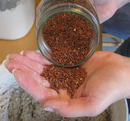Showing Food Flaxseed
| General Information | |||||||||||||||||||||||||||||||||
|---|---|---|---|---|---|---|---|---|---|---|---|---|---|---|---|---|---|---|---|---|---|---|---|---|---|---|---|---|---|---|---|---|---|
| Name | Flaxseed | ||||||||||||||||||||||||||||||||
| Scientific Name | Linum usitatissimum | ||||||||||||||||||||||||||||||||
| Description | Flax (also known as common flax or linseed) is a member of the genus Linum in the family Linaceae. It is a food and fibre crop that is grown in cooler regions of the world. Flax fibres are taken from the stem of the plant and are two to three times as strong as those of cotton. As well, flax fibres are naturally smooth and straight. Europe and North America depended on flax for cloth until the nineteenth century, when cotton overtook flax as the most common plant used for making linen paper. Flax is grown on the Canadian Praires for linseed oil, which is used as a drying oil in paints and varnish and in products such as linoleum and printing inks. It is native to the region extending from the eastern Mediterranean to India and was probably first domesticated in the Fertile Crescent. Flax was extensively cultivated in ancient Ethiopia and ancient Egypt. A discovery reported in 2009 of spun, dyed, and knotted wild flax fibers in a prehistoric cave in the Republic of Georgia shows that the plant was already in use by humans at the surprisingly early date of 30,000 B.C. New Zealand flax is not related to flax but was named after it, as both plants are used to produce fibers. | ||||||||||||||||||||||||||||||||
| Primary ID | FOOD00101 | ||||||||||||||||||||||||||||||||
| Picture |  | ||||||||||||||||||||||||||||||||
| Classification | |||||||||||||||||||||||||||||||||
| Group | Herbs and Spices | ||||||||||||||||||||||||||||||||
| Sub-Group | Oilseed crops | ||||||||||||||||||||||||||||||||
| Taxonomy | |||||||||||||||||||||||||||||||||
| Superkingdom | Eukaryota | ||||||||||||||||||||||||||||||||
| Kingdom | Viridiplantae | ||||||||||||||||||||||||||||||||
| Phylum | Streptophyta | ||||||||||||||||||||||||||||||||
| Class | Magnoliopsida | ||||||||||||||||||||||||||||||||
| Order | Malpighiales | ||||||||||||||||||||||||||||||||
| Family | Linaceae | ||||||||||||||||||||||||||||||||
| Genus | Linum | ||||||||||||||||||||||||||||||||
| Species | usitatissimum | ||||||||||||||||||||||||||||||||
| Variety | Not Available | ||||||||||||||||||||||||||||||||
| External Links | |||||||||||||||||||||||||||||||||
| ITIS ID | 29226 | ||||||||||||||||||||||||||||||||
| Wikipedia ID | Flax | ||||||||||||||||||||||||||||||||
| Composition | |||||||||||||||||||||||||||||||||
| Compounds |
Processing... | ||||||||||||||||||||||||||||||||
| Macronutrients |
Showing 1 to 6 of 6 entries (filtered from 7 total entries) | ||||||||||||||||||||||||||||||||
| References | |||||||||||||||||||||||||||||||||
| Content Reference | — Duke, James. 'Dr. Duke's Phytochemical and Ethnobotanical Databases. United States Department of Agriculture.' Agricultural Research Service, Accessed April 27 (2004). — Saxholt, E., et al. 'Danish food composition databank, revision 7.' Department of Nutrition, National Food Institute, Technical University of Denmark (2008). — U.S. Department of Agriculture, Agricultural Research Service. 2008. USDA National Nutrient Database for Standard Reference, Release 21. Nutrient Data Laboratory Home Page. — Rothwell JA, Pérez-Jiménez J, Neveu V, Medina-Ramon A, M'Hiri N, Garcia Lobato P, Manach C, Knox K, Eisner R, Wishart D, Scalbert A. (2013) Phenol-Explorer 3.0: a major update of the Phenol-Explorer database to incorporate data on the effects of food processing on polyphenol content. Database, 10.1093/database/bat070. — Shinbo, Y., et al. 'KNApSAcK: a comprehensive species-metabolite relationship database.' Plant Metabolomics. Springer Berlin Heidelberg, 2006. 165-181. | ||||||||||||||||||||||||||||||||